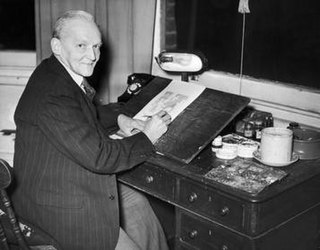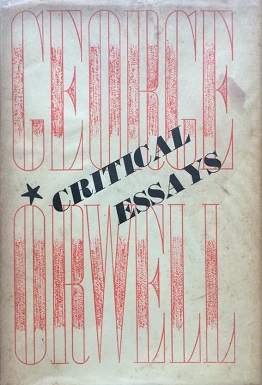Related Research Articles

Eric Arthur Blair was an English novelist, poet, essayist, journalist, and critic who wrote under the pen name of George Orwell. His work is characterised by lucid prose, social criticism, opposition to totalitarianism, and support of democratic socialism.

A postcard or post card is a piece of thick paper or thin cardboard, typically rectangular, intended for writing and mailing without an envelope. Non-rectangular shapes may also be used but are rare.

Coming Up for Air is the seventh book and fourth novel by English writer George Orwell, published in June 1939 by Victor Gollancz. It was written between 1938 and 1939 while Orwell spent time recuperating from illness in French Morocco, mainly in Marrakesh. He delivered the completed manuscript to Victor Gollancz upon his return to London in March 1939.

Black comedy, also known as dark comedy, morbid humor, gallows humor, black humor, or dark humor, is a style of comedy that makes light of subject matter that is generally considered taboo, particularly subjects that are normally considered serious or painful to discuss. Writers and comedians often use it as a tool for exploring vulgar issues by provoking discomfort, serious thought, and amusement for their audience. Thus, in fiction, for example, the term black comedy can also refer to a genre in which dark humor is a core component. Cartoonist Charles Addams was famous for such humor, e.g. depicting a boy decorating his bedroom with stolen warning signs including "NO DIVING - POOL EMPTY", "STOP - BRIDGE OUT" and "SPRING CONDEMNED."

St Cyprian's School was an English preparatory school for boys, which operated in the early 20th century in Eastbourne, East Sussex. Like other preparatory schools, its purpose was to train pupils to do well enough in the examinations to gain admission to leading public schools, and to provide an introduction to boarding school life.

Wigan Pier is an area around the Leeds and Liverpool Canal in Wigan, Greater Manchester, England, south-west of the town centre. The name has humorous or ironic connotations since it conjures an image of a seaside pleasure pier, whereas Wigan is inland and a traditionally industrial town.

Surreal humour is a form of humour predicated on deliberate violations of causal reasoning, thus producing events and behaviors that are obviously illogical. Portrayals of surreal humour tend to involve bizarre juxtapositions, incongruity, non-sequiturs, irrational or absurd situations, and expressions of nonsense.
"Such, Such Were the Joys" is a long autobiographical essay by the English writer George Orwell.

Donald Fraser Gould McGill was an English graphic artist whose name has become synonymous with the genre of saucy postcards, particularly associated with the seaside.
By the Sea, is a 1982 BBC television film starring The Two Ronnies, and written by Ronnie Barker under the pseudonyms "Dave Huggett and Larry Keith". It was the follow-up to another Two Ronnies film, The Picnic, which featured several of the same characters.

Argentine humour is exemplified by a number of humorous television programmes, film productions, comic strips and other types of media. Everyday humour includes jokes related to recurrent themes, such as xenophobic jokes at the expense of Galicians (Spaniards) called chistes de gallegos, often obscene sex-related jokes, jokes about the English, the Americans, blonde women, dark humour, word and pronunciation games, jokes about Argentines themselves, etc.
Although humor is a phenomenon experienced by most humans, its exact cause is a topic of heavy debate. There are many theories of humor which attempt to explain what it is, what social functions it serves, and what would be considered humorous. Although various classical theories of humor and laughter may be found, in contemporary academic literature, three theories of humor appear repeatedly: relief theory, superiority theory, and incongruity theory. These theories are used as building blocks for the rest of the theories. Among current humor researchers, there has yet to be a consensus about which of these three theories of humor is most viable. Proponents of each theory originally claimed that theirs explained all cases of humor, and that it was the only one capable of doing so. However, they now acknowledge that although each theory generally covers its area of focus, many instances of humor can be explained by more than one theory. Similarly, one view holds that theories have a combinative effect; Jeroen Vandaele claims that incongruity and superiority theories describe complementary mechanisms that together create humor.

Comedy is a genre of fiction that consists of discourses or works intended to be humorous or amusing by inducing laughter, especially in theatre, film, stand-up comedy, television, radio, books, or any other entertainment medium. The term originated in ancient Greece: In Athenian democracy, the public opinion of voters was influenced by political satire performed by comic poets in theaters. The theatrical genre of Greek comedy can be described as a dramatic performance pitting two groups, ages, genders, or societies against each other in an amusing agon or conflict. Northrop Frye depicted these two opposing sides as a "Society of Youth" and a "Society of the Old". A revised view characterizes the essential agon of comedy as a struggle between a relatively powerless youth and the societal conventions posing obstacles to his hopes. In this struggle, the youth then becomes constrained by his lack of social authority, and is left with little choice but to resort to ruses which engender dramatic irony, which provokes laughter.
"Some Thoughts on the Common Toad" is an essay published in 1946 by the English author George Orwell. It is a eulogy in favour of spring.
Riding Down from Bangor is an essay published in 1946 by the English author George Orwell. In it, he muses on 19th-century American children's literature and the type of society it portrayed.

Paul McDonald is a British academic, comic novelist, and poet. He teaches English and American Literature at the University of Wolverhampton, where he also runs the Creative and Professional Writing Programme.
Charles Grigg more commonly known as Charlie Grigg was a British comic artist for DC Thomson. He was the artist of The Dandy cover strip Korky the Cat. He also drew Desperate Dan after the original artist, Dudley Watkins, died. In The Topper comic he drew Splodge, Willy Nilly, Foxy and Shorty Shambles.

Critical Essays (1946) is a collection of wartime pieces by George Orwell. It covers a variety of topics in English literature, and also includes some pioneering studies of popular culture. It was acclaimed by critics, and Orwell himself thought it one of his most important books.
Martin Anderson,, better known by his pseudonym Cynicus, was a Scottish artist, political cartoonist, postcard illustrator, and publisher.
References
- 1 2 BBC Radio 4 Postcard Censorship
- 1 2 The Independent Rhoda Koenig Sun, Sea and Censorship 1 July 2004
- ↑ Jacintha Buddicom Eric & Us 1974 Leslie Frewin
- ↑ e.g. Macbeth, Act 2, scene 1
- ↑ "The World of Donald McGill" Buckland,E: London, Blandford, 1990 ISBN 0-7137-1400-X
- ↑ The Social Affairs Unit – Christie Davies "Donald McGill was a far better artist than Orwell acknowledges"